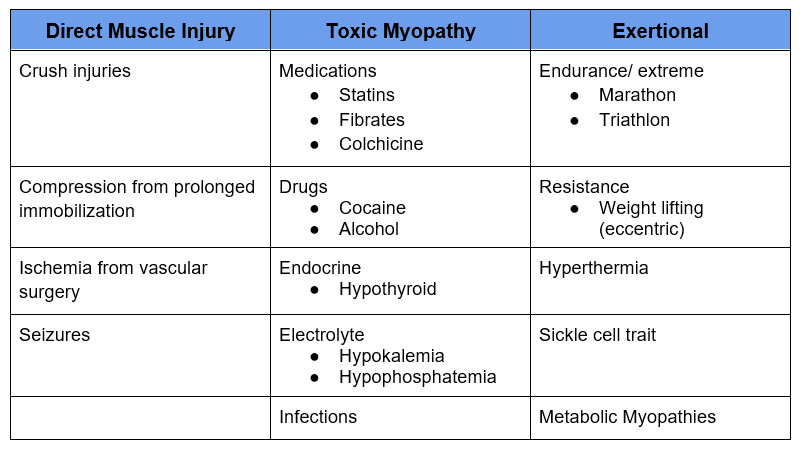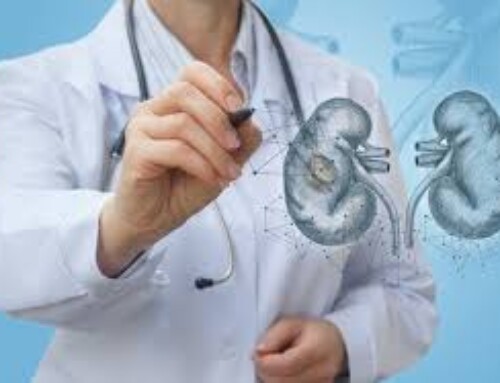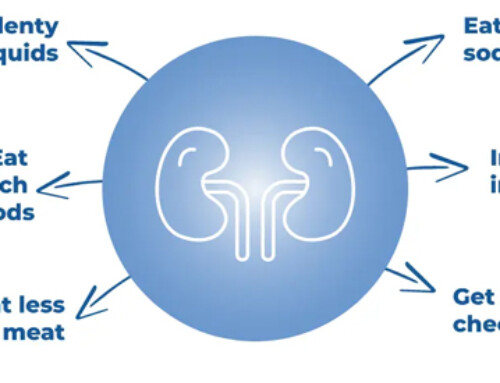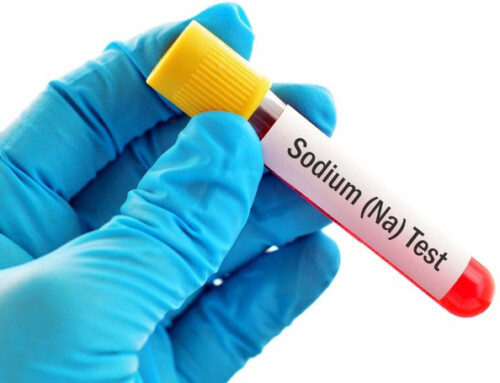Table of Contents
What is rhabdomyolysis?
Rhabdomyolysis is a condition where there is muscle necrosis with release of intracellular muscle contents into the systemic circulation. Most notably:
- CK (creatine kinase): detected in blood
- Myoglobin: detected in urine
- Others
- AST/ALT
- If severe: Potassium, Phosphorus, Urate, Lactic acid
In rhabdomyolysis the CK is markedly elevated. When is the CK elevation a mild asymptomatic variant or a normal physiologic response to exercise? What is markedly elevated?
Marked CK elevation has been defined as
- > 5 – 10 x upper limit normal
- Usually > 5,000
Severity of CK elevation:
- Mild < 10 x normal
- Moderate 10-49 x normal
- Severe > 50 cx normal
Why do we care?
If severe rhabdomyolysis can cause:
- Acute Kidney Injury (AKI)
- Compartment syndrome
- Hyperkalemia and metabolic acidosis
- Can be fatal
Rhabdomyolyis induced AKI
- Severe CK elevation:
- Typically CK > 15,000 – 20,000
- Rare if CK < 5,000 – 10,000
- Risk score for AKI or death includes a CK > 40,000
- Mechanism of AKI
- Vasoconstriction of afferent arterioles
- Myoglobin toxicity to proximal tubular epithelial cells
- Tubular obstruction: Myoglobin can combine with Tamm Horsfall protein to form tubular casts
- Muscle edema may contribute to intravascular hypovolemia
What are the causes of rhabdomyolysis?

When do we suspect rhabdomyolysis?
- Clinical context:
- Crush injury
- Prolonged Immobilization
- Clinical symptoms:
- Myalgias
- Muscle weakness
- Muscle edema
- Red/brown urine (from myoglobinuria)
- Lab abnormalities
- Unexplained creatinine elevation. Serum creatinine can be increased because of decreased renal excretion (as in AKI), or for increased generation. As creatinine is produced from the breakdown of muscle creatine, a person with rhabdomyolysis will have increased creatinine generation even without decreased glomerular filtration (AKI).
Two Reasons For Elevated Creatinine @BCNephro – YouTube
- Urinalysis: Dipstick positive for blood with few or no red blood cells on microscopy. Myoglobin causes a false positive urinalysis dipstick for blood
Exercise Induced Creatinine Kinase Elevation
Extreme exercise, endurance or resistance can be associated with rhabdomyolysis especially if there is concomitant hyperthermia and/or volume depletion. However, there often is a creatine kinase elevation as a physiologic response to exercise. It is not clear what CK values constitute a physiologic response to exercise as opposed to mild rhabdomyolysis (muscle necrosis).
Creatine Kinase elevations post exercise can be related to:
- Increased muscle cell permeability to CK
- Increased oxygen demand
- Ischemia – reperfusion injury.
There may be genetic factors with some being “high” CK responder.
There are also specific factors with muscles being exposed to stress they are not accustomed to. CK elevations have been associated with:
- Eccentric (muscle lengthening) as opposed to (concentric (muscle shortening) or static exercises. Although weight lifting typically have eccentric and concentric components
- Decreased rest time between sets
- Upper body > Lower body
- The total volume listed was not associated.
Degree of CK elevation:
- Resistance Exercise:
- CK can increase to 300-6,000+ 24-96 hrs post
- < 500 (Low response)
- 500 – 2000 (Medium response)
- > 2000 (High response)
- Endurance Exercise:
- Post Marathon mean CPK
- Men @ 3300
- Woman @ 950
- Post Marathon mean CPK
Summary
Rhabdomyolysis is a syndrome of muscle necrosis that can be caused by muscle trauma, toxicity, or exertion. When severe it can result in severe manifestations such as Acute Kidney Injury, compartment syndrome and can be fatal. This is most commonly elevated serum creatinine kinase levels, although it isn’t clear what degree of elevation is clinically meaningful.



